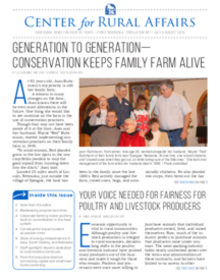Editor's note
Since its inception, the Center for Rural Affairs has chosen to advance a set of values that reflect the best of rural America. This month’s newsletter focuses on “FAIRNESS that allows all who contribute to the nation’s prosperity to share in it.”
In this edition, you will read about Joan Burhmann, a 93-year-old working to make sure the next generation has a fair chance at rural life.
We explain why your voice is needed to ensure fairness for poultry and livestock producers, and how you can submit a comment to USDA. In a related story, we talk about building the vitality of a rural community and its food system while pushing back on corporate consolidation.
In the states of Iowa, South Dakota, and Nebraska, net metering has different definitions, and we are working hard to advocate for fairness in policy and energy independence.
In Nebraska, during the 2019 legislative session, you, our constituents, played an important role in the passage of a number of bills, helping homemade food producers, reinvigorating funding for small business programming, preserving the beginning farmer tax credit, and more.
Lastly, in our executive director’s essay, he talks about housing in rural communities—specifically, funding for housing. He identifies several ways communities are responding to provide better access to home ownership.
Inside this issue
Generation to generation—conservation keeps family farm alive — At 93 years old, Joan Buhrmann’s top priority is still her family farm.
Your voice needed for fairness for poultry and livestock producers — Economic opportunity is vital to rural communities. Although poultry and livestock production is integral to rural economies, decades-long shifts in the poultry and livestock industry have pushed many producers out of the business and made it tough for those who remain.
From the desk of the executive director: connecting capital and small town home ownership — Home ownership increases family and community stability. When residents live in a community they shop at local businesses, take part in community organizations, and send their children to local schools. Home ownership is also a key strategy to help low and middle income families build assets.
Beekeeping program launches — Those interested in beekeeping have a new learning opportunity. The Center for Rural Affairs and University of Nebraska-Lincoln are partnering to offer Great Plains Master Beekeeping, a regional beekeeper training and certification program.
Corporate farming notes: pushing back on consolidation in the food system — Consolidation of companies in the food system has had negative impacts for rural communities. One detriment is lack of choice and higher prices for farmers when purchasing inputs, as fewer and fewer corporations control seed and chemical production.
Constituents’ impact evident as session ends — Nebraska’s 2019 legislative session closed with the last day of May, adjourning five days early. This early adjournment was met with contention as a substantive solution to the state’s reliance on property tax to fund K-12 education was again left unresolved. Just days into the interim, discussions are already underway to develop a compromise property tax relief and business incentive package for the 2020 session.
State of energy independence in Iowa, South Dakota, and Nebraska — Anyone who has invested in a distributed generation system will freely admit that the sun does not always shine and the wind does not always blow. This atmospheric reality can make it difficult for producers to rely exclusively on distributed energy. To overcome intermittency, system owners can choose to ration their energy use, invest in battery storage, or remain connected to the electric grid.
Staff Spotlight: Wyatt’s dedication to rural America continues — His first job was in agriculture. Wyatt Fraas spent summers bucking hay bales as the wagon he rode on swayed and creaked across the field, trying to pitch him, and the bales, to the ground.


